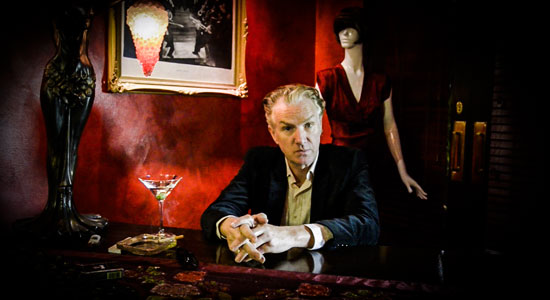
Former Bad Seed Mick Harvey brings you his love for Serge Gainsbourg once again
About 20 years ago, Mick Harvey put out two records of Serge Gainsbourg songs, 1995’s Intoxicated Man and 1997’s Pink Elephants. The multi-instrumentalist was firmly entrenched in the Bad Seeds, the band he started with Nick Cave after the end of the Birthday Party, and had just begun working with PJ Harvey, joining her for 1995’s To Bring You My Love. The Gainsbourg records were his first solo albums.
Since then, the 57-year-old Harvey has released four more solo LPs, some of cover versions, some of his own songs. He ended his 25-year tenure in the Bad Seeds in 2009, but he’s continued to work with PJ Harvey: He coproduced 2000’s Stories From The City, Stories From The Sea and 2011’s Let England Shake. When MAGNET caught up with him to talk about Delirium Tremens, his new album of Gainsbourg covers, he was in London in rehearsals for the world tour for her new record, The Hope Demolition Project.
Two decades ago, Serge Gainsbourg, who died in 1991, was lesser known outside of his native France than he is today. Harvey became fascinated by the depth and breadth of Gainsbourg’s work when a friend passed along a compilation tape, and he set about translating the lyrics into English and recasting songs such as “Bonnie And Clyde” and “Je T’aime… Moi Non Plus.”
“They are covers in the old sense of a cover version, where you actually record the song in a similar way to the original one,” he says. “I always thought I could justify doing that because I’m doing a translation. But the European terminology is ‘interpretation.’ I think that’s the better term. After I’d done the first couple albums, I’d done what I wanted to do at that time.”
In 2014, Intoxicated Man and Pink Elephants were reissued as a double LP, and Harvey, who lives in Melbourne, Australia, played a few shows of Gainsbourg numbers.
“It turned out to be fun and kind of ridiculous, just getting up there and playing music as some sort of entertainment, which is quite unusual to me, as opposed to getting up there and doing something as a difficult artwork, which is what I find myself doing or what I think I’m doing,” he says. “So that turned into thinking about doing more work.”
He revisited some of the songs he considered the first time around and ended up delving more deeply into tunes that Gainsbourg wrote for other artists in the ’60s. Then began the time-consuming process of translating the lyrics. Harvey wanted to do translations that were faithful to the originals in meaning as well as in rhyme and meter, and that was often a challenge. “He’s really quite clever, what he’s doing with words,” says Harvey.
Once he got started, he ended up with enough material for two albums, Delirium plus a second, which is slated for later this year. Harvey says it seemed “absurd” to just do one Gainsbourg album after 20 years: “That would have felt out of proportion, in some way.”
Asked which Gainsbourg album he would recommend to a neophyte, Harvey hesitates. “His material changes so much over the years,” he says. “I think something from the late ’60s. He was in a very creative and musical stage because of the nature of what was going on at the time in rock music and pop music.” He finally settles on 1968’s Initials B.B. (for Brigitte Bardot): “That’s probably the album you want to get.”
—Steve Klinge







